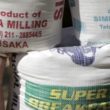Retail prices of mealie-meal in Lusaka have jumped by an average K10.00 in some outlets, registering an eight-month record high of K80 per 25Kg breakfast bag.
And the Millers Association of Zambia (MAZ) says prices could be adjusted further depending on what price farmers decide to offload their maize this year.
A check at Lusaka’s major retail outlets revealed that prices of the essential commodity had jumped by an average K10 for a 25Kg bag of breakfast, while in other outlets prices had soared by over K20 in just eight months.
A 25Kg breakfast bag of Simba No. 1 was found selling at K80 at Chelstone market, while the Pembe brand was also pegged at the same price, compared to K65 last September.
In Kabwata market, the same brands were also found selling for similar prices compared to last September.
Elsewhere, a check at the major retail outlets in Lusaka also found prices had leaped substantially.
A 25Kg breakfast bag of Pembe in Shoprite at Twin Palm Shopping Mall was priced at K78.99, up from K56.99 last September.
The Mother’s Pride brand in Choppies, Ibex Hill, also registered a similar increase to K85.99 by mid-May per 25Kg breakfast bag.
Other notable brands such as Superior Milling’s ‘Superfine Breakfast’ also had hiked prices of K74.99 per 25Kg breakfast bag, up from K63.99 by the end of last year, for the same quantity in Shoprite at Twin Palm Shopping Mall.
According to Central Statistical Office (CSO) data, mealie-meal prices have spiked significantly to a six-month high as a 25Kg breakfast bag now costs an average K77.34, up from K69.36 recorded last October.
This represents a dramatic reversal last year when prices of the staple commodity had steadily been dropping over a three-year period to hit lows of K66.23 per 25Kg breakfast bag by December last year.
And MAZ chairman, Andrew Chintala, warned in an interview that stable mealie-meal prices during the forthcoming crop marketing season will depend on what prices farmers will offload their maize.
“Going by the current obtaining prices on the open market as far as maize is concerned, in the last two months, we have seen a stable price in terms of maize purchases that we have been buying. So, it’s a bit too early to comment on that because we do not know at what price the farmers will be offloading the 2017-2018 crop. But, should the price come at the current obtaining price on the market, then we predict to have stable mealie-meal prices,” Chintala told News Diggers!
“But, obviously, if the price of the maize that will come on the market is slightly higher than what we are buying now, then definitely, we expect some price movements. But like I said, it is a bit early for me to make any predictions because we don’t know what the farmers will be asking for.”
He, however, added that the country still has sufficient stocks for continued mealie-meal and stock feed production.
“We are assured of a stable supply of the commodity, and I think we are also ready to continue supplying the commodities on the market, that is mealie-meal as well as stock feed. As long we are assured of stable supply of the commodity [maize], we can equally assure the consumers that we will continue supplying the market, and make sure we satisfy this market even before we look at exports,” Chintala added.
Meanwhile, Chintala, who is also Mpongwe Milling corporate affairs manager, added that millers were “happy” with this year’s maize output, despite the country forecast to harvest a 3-year record low.
The country is anticipated to record around 2,394,907 metric tonnes of maize in the 2017-2018 agricultural season, down from last year’s record bumper harvest of 3,606,549 tonnes, representing a 33.6 per cent decline.
This means that Zambia has failed to produce over three million metric tonnes of maize for the first time in three years, making this year’s harvest the lowest since the 2014-2015 season where the country produced 2,618,221 tonnes of maize.
“As millers, we are not disappointed. We are quite happy with what has been produced because we know that the country will have sufficient stocks for us to continue producing mealie-meal and stock feed to ensure that we don’t run out of any of these commodities on the market,” said Chintala.
“There were speculations and fears that the country might import [maize], but following the announcement of the [Agricultural] Minister, it is a very clear indication that there is no need for us to even think of importing even a bag of maize because I think we have produced quite enough for ourselves.”
“We have our requirements covered in that 2.4 million (tonnes).”











